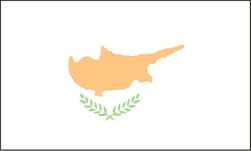Country Guide • Cyprus

Cyprus is an island republic located in the Mediterranean Sea. It is the third largest Mediterranean island. Cyprus lies off the southern coast of Turkey and the western shore of Syria. In 1974, a Greek-sponsored attempt to seize the government was met by military intervention from Turkey, which soon controlled almost 40% of the island. In 1983, the Turkish-held area declared itself the "Turkish Republic of Northern Cyprus," but it is recognized only by Turkey. UN-led direct talks between the two sides to reach a comprehensive settlement to the division of the island began in January 2002.
| Official Name | Republic of Cyprus, Turkish Cypriot area refers to itself as the Turkish Republic of Northern Cyprus |
|---|---|
| Area | 9,250km² (3,571mile²) |
| Population | 771,500 |
| Continent | Europe |
| Population per mile² | 216 |
| Capital City | Lefkosia (Nicosia) |
| Religions | The Greeks are Greek Orthodox Christians 77%, the Turkish are Muslims 18% |
| Language | Greek and Turkish although English is widely spoken too |
| Government | Presidential Republic |
| Member of EU | No |
| Currency | Cyprus Pound |
| GDP | Greek Cypriot |
| Area | $9.4 billion, Turkish Cypriot area: - $787 million |
| GDP Per Head | Greek Cypriot area: $15,000, Turkish Cypriot area: $6,000 |
| Natural Resources | Asbestos, clay, copper, gypsum, marble, pyrites, salt and timber |
| Land Use | Arable Land 10.5% |
| Agriculture | Barley, citrus fruits, grapes, olives, potatoes and vegetables |
| Industry | Tourism, fruit and vegetables, wine, clothing and shoes |
| Tourism | Cyprus has been a country divided in two since 1974. You can choose between the Turkish experience of the north and the Greek experience of the south. The south is a more popular destination but with it brings the more commercial side to resorts. There are numerous opportunities to visit ancient monastries, castles and roman ruins within a sun soaked island |
| Natural Hazards | Occasional earthquake activity and droughts |
| Health Risks | No major risks although vaccinations against Hepatitis are advised |
| Climate | Cyprus has a typical Mediterranean climate with hot dry summers and mild wet winters with rainfall occurring mainly between November and March. The average annual rainfall for the island as a whole is 20 inches. Average temperature ranges in Nicosia are from 5 to 15°C in January to 21 to 37°C in July |
| Time | GMT/UTC+2 hours |
| National Days | Cyprus Independence Day is celebrated on 1 October The Proclamation of the Turkish Republic of Northern Cyprus is celebrated on 15 November |
| Visas | A British passport holder does not need a visa prior to travelling to Cyprus. A tourist will be permitted to enter for a maximum period of three months as are nationals of the USA, Australia, Canada, Japan, New Zealand, Singapore, South Africa and the EU. If you entered Cyprus in the North (ie, from Turkey), it is illegal to cross to the Republic, although travel from the Republic to the North on a day trip is allowed, but if you are late coming home your name will be placed on a black list, prohibiting you from travelling there again |
| British Embassy | Embassy Details |
Information Only
The content above is for information purposes only and we have tried to ensure that the information is as accurate as possible. We cannot accept any responsibility for any inconvenience, loss or injury as a result of the information above. You should always check and verify any critical information like visas, health and safety and customs with the relevant authorities before you travel since information can change at any time.



